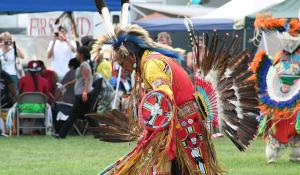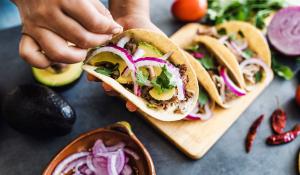
Picture a farmer. Are you seeing a gruff white man steering his tractor between perfectly aligned Iowa corn rows? If you were to look at US Census of Agriculture data on farmer demographics, you might even be convinced that this is what farming in America looks like.
The US Department of Agriculture’s National Agricultural Statistics Service conducts a census of farmland and farming communities every five years, but that data fails to highlight many of those who are out in the field every day. But in spite of this lack of representation for women and queer farmers who the survey fails to highlight, there are many incredible farming initiatives, farms themselves and research initiatives changing the face of agriculture in the US and inspiring others to see role models in women and queer people like themselves.
As climate change, institutional sexism, and discrimination disproportionately bear down on farmers and farmworkers who identify as women or queer, these individuals face more challenges getting started and staying in the workforce than their cisgender, straight, and male counterparts. This is the story of those who bear the brunt of these challenges, exacerbated by the climate crisis, and their positive adaptations to a field marked by discrimination.
Climate Change and Farming
The climate crisis has intensified the daily challenges that farmers face out in the fields, first and foremost from heat exposure. According to the American Public Health Association, crop workers face a high risk of heat-related death and illness. Excessive heat seriously injured nearly 80,000 US workers and killed 907 between 1992 and 2019 according to data analyzed by Public Citizen, though experts say heat deaths are likely under-counted. To make matters worse, pickers are often paid by the piece, like per tomato, resulting in a disincentive to take breaks, even when it’s excruciatingly hot.
An increase in pests and evaporation from rising temperatures is leading to increased use of pesticides. Pesticide exposure has a disproportionate effect on people who can get pregnant as it can increase the rate of poor birth outcomes, developmental issues, and childhood tumors. Mónica Ramírez, executive director of Justice for Migrant Women, notes that studies on farmworkers, especially in relation to pesticide exposure, have largely been focused on male farmworkers, making this impact particularly difficult to quantify.
Close-quarter living poses a challenge for farmworkers who have no other options than the farm-provided housing. Crowded conditions, a lack of air conditioning in hot climates, and an inability to follow social distancing recommendations throughout covid-19 all make housing uncomfortable, compounded by rising temperatures year after year. Lastly, farmers and farmworkers often lack insurance and thus are often excluded from affordable healthcare. This especially affects migrant farmworkers and queer farmers who face limited access in rural communities.
What About Queer Farmers?
Challenges to accessing agriculture do not stop with climate change. Markets and policies favor straight, white male farmers. Climatic challenges are exacerbated by racism, sexism, homophobia and transphobia for women, LGBTQ+ farmers, and farmers of color. Women farmers in the American West have traditionally accessed land through heterosexual relationships like marriage or inheritance, or they have had to find innovative routes to land ownership, explains Jac Wypler, sociology PhD who researches queer farmers.
“Patriarchal gatekeepers make it very difficult for queer women to gain access to land, to remain on land and to continue their businesses,” Wypler says.

in Millerton, New York.
Visibility in the marketplace is another challenge as many queer farmers seek to separate their public image on the farm from their sexuality and identity, meaning would-be farmers who can’t identify peers may never join the workforce.
As women and queer farmers are often given the lowest-paying, least desirable jobs, face fewer advancement opportunities, gender-based discrimination, and regular sexual harassment, it’s not surprising that these groups drop out of the work force at an alarming rate, according to the National Farm Worker Ministry. However, because of the lack of diverse gender options and sexual orientation questions in national censuses, the rate at which women and queer folks drop out of the workforce is not readily available. Wypler is currently working to close this data gap.
Twenty eight states do not have explicit protections for victims of discrimination based on gender or sexual orientation, in employment, housing and public accommodations, according to the Freedom for All Americans campaign. This leaves out LGBTQ+ individuals and farmers across the South and Midwest, largely.
Despite these many challenges, it’s really the persistent and exclusionary farm culture that turns many queer, nonbinary and underrepresented farmers away from the field, which makes the work of women- and LGBTQ+-owned farms all the more important.
Queering Farming Models
Despite the many obstacles women and marginalized people face in accessing land for their own farming operations, Rock Steady Farm and Flowers got started in 2015 seeking to be reflective of and serve food to the queer community they call family.
Amara Ullauri, the programs and education manager at Rock Steady, found through speaking with queer and marginalized farmers in the Northeast that there are many queer and BIPOC folks [Black, Indigenous, and other people of color] who lack entrance into the farming community, much less making the business of farming work long-term. Social and community barriers can be just as restrictive to farm ownership as the economic barriers. The Farm and Ranch Stress Assistance Network Northeast, together with Rock Steady, has launched the Northeast Queer Wellness micro-grant intended for queer and trans land stewards.
“We identified many instances of transphobia not only in the workplace but in the surrounding neighborhood… folks not necessarily involved in the farm,” Ullauri says about the research that led to the grant program. “When we’re thinking about creating a safer farm space for queer and trans farmers, we’re thinking about the overall environment, the social environment, whether we will be safe when we leave the farm premises.”
The goal of the program is to help farmers access funds to address their overall wellness, acknowledging that queer farmers know best how to help each other and what they need to support themselves.
Ang Roell of They Keep Bees founded their apiary and organization seeking to enhance the overall health of the environment. Drawing on the deep connection between identity and agriculture, They Keep Bees offers a “queer model” of beekeeping as Roell calls it, whereby they provide other farmers with queen bees in a sustainable manner. Roell calls their business an alternative to the expansionist model of beekeeping which is “very deeply tied to capitalism and rapid-growth of mono crop agriculture.”
When Roell started out, they knew that they were going to face resistance. But despite the hesitancy from farmers, They Keep Bees has blossomed, serving as a space for queer farmers to learn about beekeeping, engage in sustainable agriculture and uplift the voices of those traditionally left out of the conversation.
Roell continues to find ways to expand the beekeeping family, by breaking down the heteronormative culture of farming, bringing a social media presence to agriculture and engaging young people across the country.
“I would love to see the census create space for queer and trans and nonbinary folk to self-identify and call us families and farmers instead of glossing over us,” Roell says. “Because that’s a way that larger-scale agriculture money gets allocated.”

I would love to see the census create space for queer and trans and nonbinary folk to self-identify and call us families and farmers instead of glossing over us.
—Ang Roell, They Keep Bees
Changes to the System
As climate change, the pandemic, bigotry and discrimination rage, more and more queer people, women, and farmers of color are forced out of farming or have no way to access a career in agriculture in the first place, making it harder to feed a growing population. Simultaneously, it is becoming harder for farmers to access land, especially for queer folks.
Wypler, Ullauri and Roell all believe the key to our food crisis, exacerbated by climate change is found in support of queer farms and farming networks. For those who aren’t farmers, there are many ways to support LGBTQ+ farmers, including:
- Vote to support affordable housing.
- Back the Justice for Black Farmers Act—a bill brought to the Senate floor to provide debt relief and encourage the next generation of Black farmers through land grants—and bills like it for the queer community specifically
- Buying from queer and trans farmers at local markets.
- Donate to queer community networks such as Not Our Farm, Out in the Open, and the Queer Farmer Network.
- Write your representatives to broaden the horizons on nondiscriminatory protection laws and increase funding for marginalized demographics within farming
Diego Velasquez is an artist, podcaster, writer, photographer, and environmental nonprofit professional based out of Moab, Utah, spending his free time climbing, mountain biking, and baking bread.







